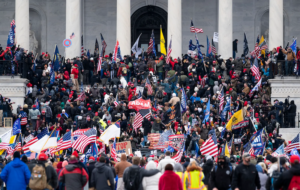While news and updates from FVI may appear in this space occasionally, substantive commentaries and articles are now published through our Substack journal. To receive this new content, please subscribe to the Freedom & Virtue Review at Substack. Thank you!
Blog

The differences between Christian theology and the philosophical foundations of the modern world cannot be starker. With Saint Thomas Aquinas, Aristotelian Christianity asserted that human beings are real beings with a substance or nature and that nature has a purpose or end built into it. This teleological universe, and we as part of it, is intelligible and intrinsically ordered. There were some in theology who adhered to a nominalist understanding of the universe and who questioned the Thomistic tradition. Prime examples are William of Ockham and later some in the Protestant tradition who sought to vindicate divine sovereignty and freedom. All order in the universe, they held, is extrinsic from the rambling chaos of matter. God imposes a given order but could have imposed another. God willed a given order but that order is extrinsic, only found in Him. His will overcomes reason. Such nominalism was introduced into politics by way of an extreme adherence to human freedom. Just as God was free to impose an order into chaos, individuals are free to impose an order into society and into their own lives. If will overcomes reason, freedom in political life should reign, they surmised.
Now, as Professor Mathew Berry tells us, “political nominalism provides a stronger foundation for brutal imperialism and fascism than it does for good government.” The reason is that only Aristotelian Christianity can tell us what freedom in the political order is for, because the teleological nature of social reality constrains the impulse to freely determine it from the outside. As Berry tells us, if we cannot say what freedom is for, we can only curtail it when it infringes the rights of others—the famous harm principle. (Mathew Berry, “Nominalism, Nihilism, and Modern Politics” Public Discourse, June 23, 2021.)
 If the order in the universe is imposed and the order in civil society is also imposed and ruled by freedom and will, not by reason, any talk of human rights is not intelligible. Modernity just needs to deny any specifics of a divine command and impose their own, but these are all imposed commands, not natural realities discovered. From a divine command imposed to a human secular command imposed there is but a short leap. Moreover, the rationale for respecting your freedom disappears. We become what Sartre called us, beasts to the other. Or, as his lover Simone de Beauvoir said, over the brute fact of silent and unintelligible matter, “social law” reigns.
If the order in the universe is imposed and the order in civil society is also imposed and ruled by freedom and will, not by reason, any talk of human rights is not intelligible. Modernity just needs to deny any specifics of a divine command and impose their own, but these are all imposed commands, not natural realities discovered. From a divine command imposed to a human secular command imposed there is but a short leap. Moreover, the rationale for respecting your freedom disappears. We become what Sartre called us, beasts to the other. Or, as his lover Simone de Beauvoir said, over the brute fact of silent and unintelligible matter, “social law” reigns.
From absolute divine power to impose His “universal law” over nature to the power of the ruler to impose his will over society there is a leap but in the same horizon. As Cardinal Ratzinger puts it, obsession with freedom leads to the tyranny of the stronger. What is decadence or malice if all is social law imposed through the triumph of the will? This triumph slipped—slightly at first—upon the slopes of nominalist denials of the Aristotelian doctrine of essence. It is no mystery that modern philosophy and modern political theory began to distrust the doctrine of essence when given the idea that they had the power of reshaping humanity, society, and reality itself within the grasp of their desires and will moved forward through power.
Why not rearrange the furniture of existence if we can? If freedom is the ability to act according to what our passions demand, why not do it? Why remain entrapped within discussions of what is the ultimate end of things when the ultimate end is our freedom? If we are, as Beauvoir told us, “freedoms”?
It’s no secret—though perhaps it hasn’t yet gotten the attention it deserves—that suicide rates have been skyrocketing among young people in the United States. What can be done to reverse this appalling trend? Social, professional, and familial interventions are valuable and should be continued, for in such a crisis an “all of the above” approach is reasonable. But the ultimate solution can only be found in a reacquaintance with the transcendent end of the human person.
Even before the pandemic, from 2007 to 2018, the rate of suicide among people aged 10 to 24 rose nearly 60 percent. The stress and social isolation brought about by COVID-19 and the societal response to it increased the risk of self-harm across the board, but the spike was most pronounced in the youngest age groups.
A recent issue of the alumni magazine from the University of Pennsylvania addressed the problem at that school. From 2013 to 2017, fourteen Penn students took their own lives. Intensifying the alarm, in 2019, the executive director of the university’s counseling service—the main institutional means for attacking the problem—committed suicide. Students have initiated their own groups and programs, many of them led by students who have struggled with their own self-destructive temptations.
 Kudos to the Penn community for bringing the problem into the light of day and to students for taking the initiative in seeking solutions. There seems to be widespread recognition among the activists that there is no single, easy answer to this distressing yet perennial human tragedy. Yet they also recognize that we ought to do what we can to minimize the threat. To that end, they correctly identify one of the chief causes of suicidal thoughts: loneliness.
Kudos to the Penn community for bringing the problem into the light of day and to students for taking the initiative in seeking solutions. There seems to be widespread recognition among the activists that there is no single, easy answer to this distressing yet perennial human tragedy. Yet they also recognize that we ought to do what we can to minimize the threat. To that end, they correctly identify one of the chief causes of suicidal thoughts: loneliness.
One of the student leaders, drawing on a 2018 survey, calls the current crop of young people “the loneliest generation.” Paradoxically, the loneliest generation grew up with the technological means to communicate with more people more constantly than ever before in history. But “social” media, it turns out, are not as beneficial as they were cracked up to be. The inverse relationship between self-esteem and the use of social media is now widely understood.
Again, though, the problem is not monocausal, and so the solution is not as simple as minimizing or avoiding social media. Social contact with others (physical rather than virtual) does not eliminate the risk. Penn’s victims of suicide were surrounded by fellow students in dormitories, in class, and in social settings. Some of them were far from socially isolated; they were popular and successful. To be a Penn student is itself a mark of success: the Ivy League school admits fewer than 10 percent of its applicants, and Penn graduates on average earn about three times the national media income. Something other than lack of achievement or good prospects is at work. Even seemingly popular and successful people can be pathologically lonely and depressed.
The Penn stories and the experience of others in this area demonstrate that social connection is key. Often it is a personal relationship—sometimes a single instance of reaching out by a friend or acquaintance—that makes the difference between life and death. This is why involvement in social institutions such as clubs, athletics, and churches, is an important means of preventing the severe isolation that provides fertile ground for suicidal thoughts.
But there is something else. Even healthy families and social organizations can be inadequate in the maintenance of a healthy view of self. Parents and siblings; ministers, rabbis, and imams; teachers, friends, and classmates can all let you down. There is one, however, who will not. The psalmist sings, “To God, the Lord, belongs escape from death” (68:20). The truth of the human person is that we are created in God’s image, that he loves us unconditionally, and that we are destined for eternal life with him.
Churches are therefore crucial not merely as social institutions but even more as preservers and conveyors of the truth about God and man. It is no coincidence that a decline in religious belief and practice—especially among youth—has occurred in correlation with a rise in suicide—especially among youth. Without a transcendent source of faith, hope, and love, we are left with the material world as the provider of those inherent and essential human ideals. The good that the world supplies may seem like enough to sustain us, but it is in fact insufficient, and this insufficiency can become unbearable in times of intense challenge.
Only the indestructible security of divine faith is a sure safeguard against the temptation to see ourselves as less than we are. “Come, let us return to the Lord” (Hos 6:1), “and you will find rest for your souls” (Mt 11:29), for “I came that they may have life, and have it abundantly” (Jn 10:10).
[ACTON INSTITUTE POWERBLOG]
Justice and charity are the duty of all – and are intimately related – but a redefinition of philanthropy that collapses the distinction between them serves neither.
The Ford Foundation gives over $500 million dollars annually, mostly in grants, to nonprofit organizations around the world. Foundation President Darren Walker came from humble beginnings in rural Texas and now oversees the Foundation’s $15 billion endowment. In his recent and wide-ranging 60 Minutes interview with Lesley Stahl he makes the case for reimaging philanthropy as not primarily about giving aid but rendering justice. Justice and charity are the duty of all – and are intimately related – but a redefinition of philanthropy that collapses the distinction between them serves neither.
Walker begins to make his case in an idiosyncratic manner. He distinguishes between generosity and justice, not as goods or virtues in themselves, but in the emotional and intellectual states of donors:
“Generosity actually is more about the donor, right? So when you give money to help a homeless person, you feel good. Justice is a deeper engagement where you are actually asking, “What are the systemic reasons that put people out onto the streets?” Generosity makes the donor feel good. Justice implicates the donor.”
Read full article HERE
End Hunger. No More War. Save the Planet. In a world of grand causes, there is a constant temptation to inflate our own importance. The temptation is especially dangerous for those who are genuinely well-meaning and of good will. Trying to make the world a better place is a praiseworthy goal; we should all be doing it. But there is a danger that our zeal to effect change on the world stage, where we have little real control, will blind us to the need to help closer to home. Few of us are in positions to make decisions about whether nations go to war, but all of us have the opportunity to promote peace among our own family and friends. We shouldn’t let a focus on purportedly world-changing crusades distract us from what matters most in the immediate sphere of our own responsibility and influence.
In its extreme form, the attempt to arrogate to oneself the authority to bring about massive good is considered a psychological disorder: the Messiah complex. But the tendency to neglect our daily duties—where we can have real impact—in favor of flashier activities is something everyone needs to guard against.
 The twentieth-century southern writer Flannery O’Connor specialized in poking holes in this particular balloon. A prime example is her short story, “The Lame Shall Enter First,” which features three main characters. Sheppard is the father of a young son, Norman, whom he deems to be of inferior intellect and in need of moral formation. Sheppard is trying, half-heartedly, to shape Norman into a more mature person, but that task is dull and unrewarding, as the boy only has so much potential. Instead, Sheppard focuses his attention on Rufus, a local ne’er-do-well who, Sheppard is sure, he can save. Rufus, he believes, has the inherent qualities his own son lacks: someday, with Sheppard’s encouragement, he will achieve greatness.
The twentieth-century southern writer Flannery O’Connor specialized in poking holes in this particular balloon. A prime example is her short story, “The Lame Shall Enter First,” which features three main characters. Sheppard is the father of a young son, Norman, whom he deems to be of inferior intellect and in need of moral formation. Sheppard is trying, half-heartedly, to shape Norman into a more mature person, but that task is dull and unrewarding, as the boy only has so much potential. Instead, Sheppard focuses his attention on Rufus, a local ne’er-do-well who, Sheppard is sure, he can save. Rufus, he believes, has the inherent qualities his own son lacks: someday, with Sheppard’s encouragement, he will achieve greatness.
We become increasingly distressed as O’Connor walks us through the evolution of Sheppard’s good intention into an obsession. Absorbed by the project of Rufus’s rehabilitation, Sheppard becomes oblivious to the needs of Norton, who is coping with the loss of his mother. The father fails to see not only Rufus’s clever manipulation and complete resistance to his methods, but also that his own desperate attempts to save others is in a way his own emotional reaction to his wife’s death.
Too late, Sheppard recognizes his mistake. Near the end of the story, the revelation dawns. Reflecting on his efforts on behalf of Rufus, he utters a haunting statement that begins as a boast but ends as an accusation: “I did more for him than I did for my own child.”
As with most O’Connor stories, the tale doesn’t end on a happy note, but the gut-wrenching climax serves to bring her point home more forcefully. “The stories are hard,” she once explained to a reader, “but they are hard because there is nothing harder or less sentimental than Christian realism.” O’Connor’s realism reminds us that the consequences of succumbing to the savior temptation could be dire.
Raising a child, performing a job with skill and dedication, maintaining true friendships—these are major accomplishments that make the world a better place. If we’re doing these things conscientiously, then devoting some energy to other causes can be appropriate and laudable. But if we’re not serving well those closest to us, then trying to save the world is an exercise in misplaced priorities. The welfare of the wide world depends on keeping our own little worlds in order.
In many localities in the United States, schools remain closed for in-person learning due to the COVID-19 pandemic (although momentum seems to be building for reopening). Even where schools have generally been open, like here in rural Ohio, there have been other challenges: repeated blankets of snow have kept the kids home for a large part of the winter. The absence of in-person learning has led many to worry about the long-term effects on students’ academic progress, and researchers are monitoring the situation to assess the damage that might be done. But education is about more than academic subjects, and we should be paying equal attention to the importance of providing opportunities for fostering the attitudes and skills that are necessary for maturing persons to pursue productive, meaningful lives.
Schooling, when done properly, cultivates those traits: discipline, reliability, consistency, persistence, collaboration, willingness to learn and adapt. Institutional schools are of course not the only means of inculcating such virtues; families are the primary and irreplaceable training ground. But schools can and often do furnish an important auxiliary service in cultivating the values that are planted in the home. In exceptional situations, schools and their personnel serve as replacements for the family life that is lacking or dysfunctional. When schools function as surrogates in this way, it is inherently an imperfect and second-best approach—but second-best is better than nothing.
 Classrooms are not the only or perhaps even the most important venue for schools’ role in promoting these essential personal qualities. Extracurricular activities—one of the collateral casualties of school closings—can be extremely valuable in this regard. Mock trial and debate clubs; dramatic productions and music programs; math and science competitions; athletic teams and social and charitable associations—all contribute immensely to building and practicing responsibility, teamwork, and determination. FVI’s own Self-Reliance Clubs, which have also been hampered by school closings, are an outstanding example of the potential of extracurricular programs to contribute to the educational mission in ways that may be neglected or impossible in most classroom settings.en
Classrooms are not the only or perhaps even the most important venue for schools’ role in promoting these essential personal qualities. Extracurricular activities—one of the collateral casualties of school closings—can be extremely valuable in this regard. Mock trial and debate clubs; dramatic productions and music programs; math and science competitions; athletic teams and social and charitable associations—all contribute immensely to building and practicing responsibility, teamwork, and determination. FVI’s own Self-Reliance Clubs, which have also been hampered by school closings, are an outstanding example of the potential of extracurricular programs to contribute to the educational mission in ways that may be neglected or impossible in most classroom settings.en
The repercussions of failing to develop positive personal capacities during children’s formative period are wide-ranging and monumental. Employers have been complaining for years about the difficulty of finding qualified candidates—the problem being for the most part not the lack of academic qualifications or technical expertise, but instead a deficit in the “soft skills” of communication, timeliness, and organization. These are abilities whose development is, again, crucially connected to a health family life; but school-based clubs and teams also excel at fostering them.
A failure to develop these traits extends beyond employment and financial matters. The same qualities that make for a successful employee also make for a successful mother or father, nonprofit board president or soup kitchen volunteer. Prospering families and communities are dependent on a critical mass of people who have a combination of awareness of social obligations and the capacity to meet them.
Louis Zamperini, the remarkable man behind the bestseller Unbroken and its film adaptation, overcame an adolescent rebellious streak by dedicating himself to high school track. “One thing you learn in sports,” he later reflected: “You don’t give up; you fight to the finish.” It was a lesson he applied to extreme situations, surviving plane crashes, shark attacks, and prison camps during World War II. His is an extraordinary case, but similar, less spectacular examples could be adduced and multiplied.
Meetings and other group events held virtually have some value along these lines, but they can’t come close to achieving the results equal to those offered by in-person activities. Youth need extracurricular opportunities to come together, guided by elders, to reach common aims by collaborating and taking responsibility for their own parts in the enterprise. The classroom is essential, but the track, the stage, and the garden are educational sites too. They are all places—real places—where young people gather and learn, give and take, fail and succeed. They are places where the character of the next generation is shaped.
Our frenetic, mercurial culture continues to provide ample fodder for social critics attuned to the absurd. In the latest in a series of jarring incongruities spawned by the morality-denying, morality-soaked industry of politically correct opinion formation, the culture of affirmation has yielded to the culture of cancellation. How did this happen, and is there a way out?
 The “I’m okay, you’re okay” mentality, birthed in the 1960s, enjoyed its heyday. As a reaction to judgmentalism, hypocrisy, and inordinate fear of difference, it was understandable. Racial and ethnic discrimination, religious bigotry, and moral posturing were real problems, and the insurrection of a younger generation against the previous generation’s faults and excesses is to be expected. It’s also predictable that the young generation becomes the old generation, and in so doing enshrines its own weaknesses and blind spots as a cultural orthodoxy against which the next cadre of Young Turks will rebel.
The “I’m okay, you’re okay” mentality, birthed in the 1960s, enjoyed its heyday. As a reaction to judgmentalism, hypocrisy, and inordinate fear of difference, it was understandable. Racial and ethnic discrimination, religious bigotry, and moral posturing were real problems, and the insurrection of a younger generation against the previous generation’s faults and excesses is to be expected. It’s also predictable that the young generation becomes the old generation, and in so doing enshrines its own weaknesses and blind spots as a cultural orthodoxy against which the next cadre of Young Turks will rebel.
There is doubtless an element of generation effect in the contemporary rejection of an overweening toleration as the unassailable virtue of our times. But it’s also true that intellectual errors give rise to their nemeses not only as a result of reaction, but also as result of logical unfolding. Toleration of difference—I’m okay, you’re okay—was never philosophically defensible as an absolute value. As myriad critics asked, What can an ethic of toleration do against an ideology of intolerance? The practical exigencies of law and order require that some things not be tolerated. So it will ever be.
Thus the culture of affirmation—in which self-esteem was the primary value and injuring someone’s sense of self-worth the cardinal sin—has given rise to the culture of cancellation, where it is not only permissible but mandatory, once a person has fallen afoul of the arbiters of acceptable opinion, to attack that person’s views, attributes, and identity—the more personal the assault the better. Calculation of damage to the person’s self-esteem seems not to enter the equation.
For decades, sophisticated intellectuals analyzing exotic milieus have carefully deconstructed religious rituals such as shunning and scapegoating. Now sophisticated intellectuals unselfconsciously practice shunning and scapegoating with reckless abandon in the corridors of their universities. This development—the replacement of absolute toleration by absolute adherence to “woke” ideology as the regnant orthodoxy—is already generating its reaction. The enormous popularity among young people of Professor Jordan Peterson—“the personification of the backlash to outrage and denunciation culture”—is one barometer.
The way out of this vicious cycle is to abandon the modern construction of new “virtues” and return to the classical and Christian ones. Justice, fortitude, temperance, and prudence—unlike toleration and affirmation—are habits whose practice does not generate excesses that in turn induce corrective reaction. Toleration practiced universally is impractical; certain actions and attitudes must be disfavored or disallowed in order to maintain a tolerant society. Real virtues aren’t like that; they can be pursued relentlessly and applied consistently. In popular speech, it may be possible to be “too just” or “too prudent,” but as a matter of moral philosophy it isn’t. To be just is to give to people what they are due. This can and should be practiced always and everywhere. To be prudent is to assess situations accurately and make the judgments necessary to act wisely. This is always desirable: by definition, one cannot be “excessively prudent,” because prudence would preclude it. Justice and prudence account for what toleration and affirmation do not. Justice dictates that some behavior deserves affirmation while other behavior deserves criticism or correction. Prudence enables the virtuous person to ascertain which situations are which and to act accordingly.
The traditional virtues were applicable to ancient Greece and medieval Europe, and they will work just as well in twenty-first-century America. Reacquainting ourselves with the timeless principles for living an ethical life will do more to promote freedom, stability, and comity than chasing after the next faddish exercise in virtue signaling.
In the past year, many American cities experienced violent outbursts during and after protests led by groups such as Black Lives Matter (BLM) and Antifa’s united front. Their attacks still continue in some areas. On January 6, we also witnessed violence at the U.S. Capitol during protests led by supporters of President Donald Trump over the legitimacy of the 2020 election.
Comparing these two deadly outbreaks has become controversial. Some point out disparate responses to the outbreaks, with political and media figures being accused of treating the Capitol mayhem with a contempt absent from their treatment of BLM looting. What should we make of this?
There is certainly merit to the accusation of hypocrisy against those who respond to violence based on the political or ideological alignment of its perpetrators. This accusation, however, works both ways, as employing an ideologically motivated smokescreen to minimize the disorder coming from friendly quarters is common to the Left and the Right alike. Claims of disenfranchisement and victimization by insidious forces have radicalized elements across the political spectrum.
 However, the justifications for opposing our governmental system are treated differently by people on either side of this controversy. The main difference is that only on the Left do we see an organized ideological movement that justifies antagonism against the present order of things – an attitude also seemingly embraced by corporate America, the educational establishment, the media, and various politicians. The second major difference is that the violence associated with racial protests has been consistently repeated and yet gained mainstream indifference or, at times, outright support. Organized right-wing extremism, on the other hand, is a fringe phenomenon that is almost universally shunned.
However, the justifications for opposing our governmental system are treated differently by people on either side of this controversy. The main difference is that only on the Left do we see an organized ideological movement that justifies antagonism against the present order of things – an attitude also seemingly embraced by corporate America, the educational establishment, the media, and various politicians. The second major difference is that the violence associated with racial protests has been consistently repeated and yet gained mainstream indifference or, at times, outright support. Organized right-wing extremism, on the other hand, is a fringe phenomenon that is almost universally shunned.
Take, for example, self-described agitator Vicky Osterweil, who released In Defense of Looting. The book defends looting as an ideological statement against an allegedly immoral and racist capitalist system and its unequal distribution of wealth. Osterweil’s defense of looting is based on a Marxist economic analysis that renders the entire economic system illegitimate. Looting “attacks the idea of property, and it attacks the idea that in order for someone to have a roof over their head or have a meal ticket, they have to work for a boss, in order to buy things that people just like them somewhere else in the world had to make under the same conditions,” Osterweil toldNPR. “It points to the way in which that’s unjust.” Robbery, the book claims, harms only the oppressive system of free enterprise and the oppressive concept of “law and order” that perpetuates the status quo.
Notice how the author leverages a generalized assumption of oppression to glorify BLM’s offenses against the present constitutional order. In the case of the Capitol rioters, however, the offenders are not celebrated but castigated for rebelling against the same constitutional order. It seems as if the political and ideological aims are what is important, and “the system” is instrumentalized on account of that aim.
Osterweil’s book is not an isolated example. The idea that America is systemically racist, and the constitutional order is oppressive and invalid, is the very foundation of Critical Race Theory. The Pulitzer Prize-winning 1619 Projectasserts that “the very basis of property in the U.S. is derived through whiteness and through [b]lack oppression, through the history of slavery and settler domination of the country.” The 1619 Project’s narrative calls for the dismissal of the American constitutional system – not merely its reform but a radical rejection of the entire political, social, and economic structure of American life.
This narrative isn’t drawn from the perspective of black Americans as they collectively reflected on the American experience; this view is derived from applying the radical, socialist analysis of America to black citizens. The black experience is filtered through the radical beliefs that American ideals were a lie from the beginning and that the institutional framework upon which America was built is illegitimate, intrinsically racist, and irreformable; thus, it must be rejected. These ideas are not a mere emotional reaction to recent electoral events but a systematic analysis pervasive among the elite which has filtered down to the masses, thereby forming what political philosopher Hannah Arendt’s The Origins of Totalitarianism calls a “terrifying negative solidarity.” Solidarity forms around a narrative of victimization, which feeds on an authentic historical experience that is totalized. This totalization creates a closed system of thought, which indicts the body politic as a whole in the name of group cohesion. Love for the group demands the acceptance of the narrative and condemns the constitutional framework that sustains an entire society invested in racism. (For an examination of the totalitarian impulse in general, see Rod Dreher’s Live Not By Lies: A Manual for Christian Dissidents.)
 Worse yet, this view’s proponents have fashioned a public school curriculum around the 1619 Project, and any criticism of the project is countered by accusations of racial animosity. The filtering of the general question of race through a radical explanatory system is conflated with a concern for racial justice, which justifies a rejection of the constitutional order. This analysis seems to condone the mob’s imposition of its views of justice “by any means necessary” – but only with regard to the question of race. This is how an attack on the constitutional order can be seen as so detrimental when it comes from one quarter but so justified when it comes from another, even when the latter attempt is in fact more systematic, entrenched, and destructive.
Worse yet, this view’s proponents have fashioned a public school curriculum around the 1619 Project, and any criticism of the project is countered by accusations of racial animosity. The filtering of the general question of race through a radical explanatory system is conflated with a concern for racial justice, which justifies a rejection of the constitutional order. This analysis seems to condone the mob’s imposition of its views of justice “by any means necessary” – but only with regard to the question of race. This is how an attack on the constitutional order can be seen as so detrimental when it comes from one quarter but so justified when it comes from another, even when the latter attempt is in fact more systematic, entrenched, and destructive.
It is as if the taxonomical category of victimized groupconfers a sort of epistemic privilege granting it immunity for its actions, which is not granted to those whose identity is more aligned with a purported racial transgressor. We are told we must accept this grant of immunity by creating a different set of rules for analyzing the aims and activities of these victims of history. (For a good analysis of identity politics, see Joshua Mitchell, “The Identity Politics Critique of the American Republic,” in Gerald McDermott’s Race and Covenant: Recovering the Religious Roots for American Reconciliation, pp. 79-97.)
Far from a necessary ingredient of an ideology that upholds violence, Dr. Martin Luther King Jr. soberly referred to rioting as a “temper tantrum” by people losing hope. In other words, it was not ideologically motivated. As he stated, “Violence may go to the point of murdering the hater, but it doesn’t murder hate. It may increase hate. It is always a descending spiral leading nowhere.”
The 1619 Project, on the other hand, is informed by the assumptions of Critical Race Theory. CRT is first and foremost a proposed explanation of origins that focuses on what it proclaims is the intrinsically racist nature of our society’s legal framework. It sees the problem of race as a systemic (as opposed to systematic) one and the law as its most powerful instrument. It starts with the a prioriassumption that the United States is rooted in white supremacy. From there, the theory concludes that white supremacy is written into the law, even if not overtly stated. Disparate outcomes in economic, legal, and social areas of life are explained by the given of intrinsic racism. Critical Race Theory is mostly a cataloguing of examples that admits no challenging of premises. When CRT speaks of the “oppressed” or the “marginalized,” it is not referring to present states of affairs affecting given groups but to a class of people who are marginalized by definition.
With such theories spreading like wildfire in academic, cultural, political, legal, theological, and judicial circles, it is to be expected that one cannot oppose violence by the “oppressed” against the “oppressive” system without being accused of abetting the oppressors. This is why a limited, violent action by political opponents against the very system CRT considers illegitimate (like the attack on the U.S. Capitol) is utilized as a reason to delegitimize the opposition. How can the rejection of our nation’s constitutional framework receive accolades, while a similar rejection coming from the other side of the political spectrum – and one that is a completely out-of-the-mainstream minority view – be rejected with moralistic zeal?
What at face value seems contradictory makes perfect sense within the framework I have outlined. The question at hand is not whether the system is illegitimate; the question is what tactic can advance the ideological aims of those intent on destroying the system from the side of the “oppressed.”
While we should indeed avoid drawing facile distinctions in an attempt to justify acts of political violence that suit our political alignment – and them alone – fear of this kind of hypocrisy should not prevent us from making a valid examination of the ideological background that explains the inconsistency in mainstream assessments of these two expressions of violence. Otherwise, substantive analysis will give way to the weak comparisons that spring from a politicized context.
No contemporary issue demands greater clarity of thought. Alas, no issue is getting less of it.
In the Western Christian tradition, the season of Lent begins this week. This season of penance in preparation for Easter is highly relevant to the maintenance of a free and virtuous society.
Last week I wrote about the connection between self-control and self-government. That article highlighted the founders’ insistence that religion and morality were necessary supports to a political system characterized by self-governance, because they promote self-control among the citizenry. The season of Lent invites us to focus more closely on exactly how the virtue of self-control is cultivated.
The three principal practices of Lent are prayer, fasting, and almsgiving. Fasting most obviously involves refraining from food, but it can include abstaining from any otherwise good substance or activity. The Catholic Church and some other churches provide specific guidance about how to fast during Lent, but the details are not important for our purposes. What’s critical is to recognize the salutary spiritual and psychological effect of fasting for the human soul and mind.
Fasting is a form of mortification, which means voluntarily undertaking physical difficulty or deprivation so as to achieve mastery over the body. It is often associated with religious practice and as such has a spiritual dimension, but it also has a purely psychosomatic effect. It is a way to foster the habit of self-control, of training the mind to govern the body and its passions rather than permitting the reason to be a slave to physical desires.
This is why the original Catholic Encyclopedia points out that fasting has a basis in natural law; that is, its purpose is accessible to reason even without the assistance of revelation. The practice of fasting cultivates the classical and cardinal virtue of temperance. Pre-Christian philosophers recommended fasting for this reason—independent of any religious rationale or prescription. Aristotle described temperance as moderation in the pursuit of physical pleasure. Its corresponding vice is self-indulgence. “The self-indulgent man,” the Greek philosopher said, “craves for all pleasant things or those that are most pleasant, and is led by his appetite to choose these at the cost of everything else.”
One who pursues bodily pleasure “at the cost of everything else” does not have control of his passions; his reason is not in the driver’s seat. Individual happiness and fulfillment is one casualty of self-indulgence, but the common good—societal wellbeing—is another. This is because, as last week’s article noted, self-control is indispensable for self-government.
 Thus, while Christians and other people of faith may have religious motivations for restricting food or drink or the use of other goods, the virtue that is cultivated through this practice—self-control—is one that is universally desirable. Fasting is therefore one concrete way by which we can foster the personal habits necessary to maintain a thriving society. The Dutch legal philosopher Hugo Grotius summarized the principle in the seventeenth century: “A man cannot govern a nation if he cannot govern a city; he cannot govern a city if he cannot govern a family; he cannot govern a family unless he can govern himself; and he cannot govern himself unless his passions are subject to reason.” The seemingly private and personal virtue of self-control thus has ramifications that project outward and upward, affecting the very stability of a political regime.
Thus, while Christians and other people of faith may have religious motivations for restricting food or drink or the use of other goods, the virtue that is cultivated through this practice—self-control—is one that is universally desirable. Fasting is therefore one concrete way by which we can foster the personal habits necessary to maintain a thriving society. The Dutch legal philosopher Hugo Grotius summarized the principle in the seventeenth century: “A man cannot govern a nation if he cannot govern a city; he cannot govern a city if he cannot govern a family; he cannot govern a family unless he can govern himself; and he cannot govern himself unless his passions are subject to reason.” The seemingly private and personal virtue of self-control thus has ramifications that project outward and upward, affecting the very stability of a political regime.
In a pluralistic society, not all will observe Lent. Not all will fast. Not all will abstain from meat. But Lent is a reminder that we all need to find a way to practice the subordination of the passions to reason, to cultivate the virtue of self-control. If we do not—if we allow our insatiable physical desires to dictate the contours of our lives—then we imperil ourselves, our communities, and our nation.
The grand experiment of the American republic was based, James Madison said, on “the capacity of mankind for self-government.” Adams and the other founders believed that the era of political absolutism—of lodging complete power in a ruler or group of rulers without regard for the self-determination of the people—could be relegated to the past. But this experiment depended on one, indispensable condition: that the people be willing to shoulder the responsibility given them. Self-government did not simply the right to vote; it meant that the voters must take up the burdens of governance throughout their lives. Thus the durability of the American experiment depended on the persistence of a certain kind of people: a “moral and religious people.”
That formulation comes from John Adams’ well-known claim: “Our Constitution was made only for a moral and religious people. It is wholly inadequate to the government of any other.” George Washington said similarly, “Of all the dispositions and habits which lead to political prosperity, religion and morality are indispensable supports.” Adams and Washington were not mouthing rhetorical platitudes; they were voicing a conclusion based on robust historical and philosophical premises, a tenet held almost universally by the founders: that only a virtuous people could sustain the republic they had designed.
Why was this so? Because people ceded power to government for the purpose of maintaining order. The more that order needed to be imposed from above, the more power government would need. Conversely, the more that order was self-imposed, the less demand there would be for vigorous government intervention. (Recent images of a military-occupied Capitol are a graphic reminder of the authoritarian crackdown that disorder invites.) The self-imposition of order, the founders understood, was achieved by the exercise of self-control, which was the bridling of passion by reason. Self-control was a virtue that required effort and cultivation. And virtue, they further understood, was most commonly imbued and achieved by the practice of religion. Therefore, the Constitution—which stipulated a government whose powers were strictly limited—depended on a “moral and religious people.”

Bill Clark:CQ-Roll, Inc via Getty Images
This is one of the reasons the founders were so concerned with the often-misunderstood and later-corrupted principle of the separation of church and state. They insisted that there be no state-sponsored (“establishment”) church not because they thought that religion was unimportant or should be relegated to the private sphere, but because they were convinced that religion was essential for societal wellbeing and was a vital support for government. It was imperative that the American citizenry maintain a vibrant and meaningful religious sensibility, which would in turn serve to sustain virtue. Government control of religion weakened this role by, at best, corrupting religion, and at worst, suppressing genuine religious practice when it did not conform to authorized expressions.
It is true that some of the founders had an overly utilitarian view of religion, which explains why they were not devout and orthodox believers themselves. But their utilitarian calculation was nonetheless correct. The self-control necessary to support self-government is a virtue that is difficult to sustain in the absence of widespread religious belief. Religion provides both the worldview and the communal environment within which sacrifice makes sense. Without it, self-aggrandizement easily vanquishes self-control, and the passions easily run rampant over reason. As concupiscence—the sinful weakness of human nature—takes over, anarchy spreads: in the family, in the workplace, in the school, and in politics.
In the early decades of the American experiment, the French visitor Alexis de Tocqueville could still perceive these connections. “In America, religion leads to wisdom,” he wrote, and “the observance of divine law guides men to freedom.” Would he be able to make the same observation about today’s America?

